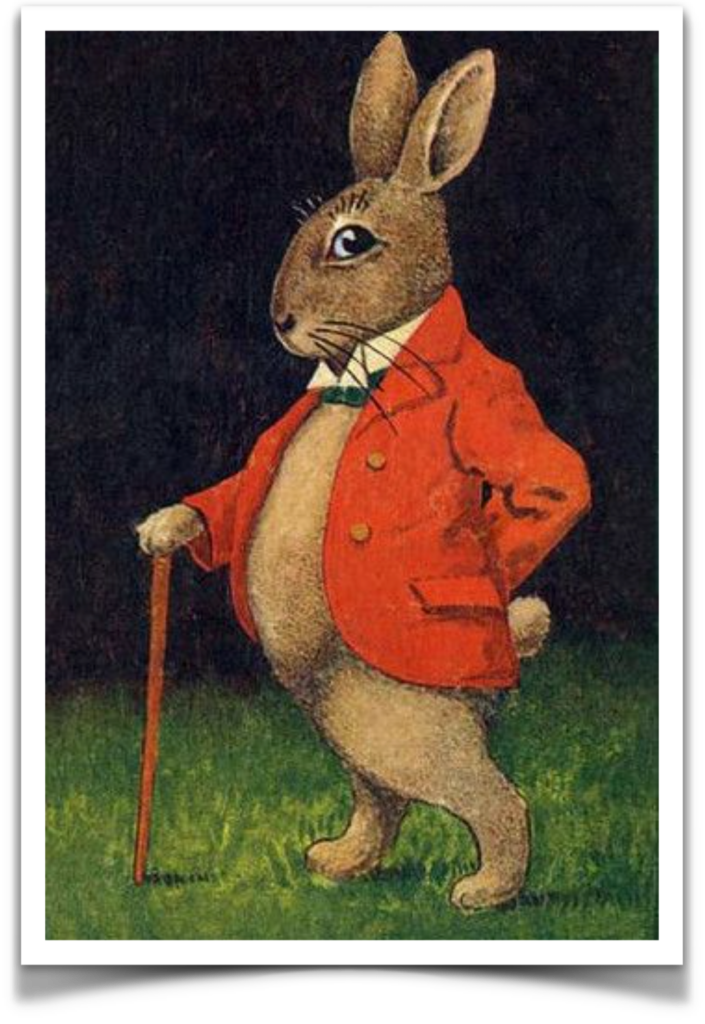
Rhymatism
“Last night in the dark,” said Raccoon, “I went to the park. And I know there were trees, ‘cause they bothered my knees.”
“Raccoon,” said Squirrel, “what are you talking about?”
“I’m trying to say, that I’m trying to play. When I look for my stuff, it gets really tough,” said Raccoon.
Squirrel looked at Raccoon. She’s doing it again,” he said to Beaver. “She’s just going to be impossible to talk to for a while.”
“Do you not see my point?” said Raccoon to Porcupine, “is your nose out of joint? Have you something to add? Are you happy and glad?”
“Good grief,” said Porcupine, “I see what you mean, Squirrel. Does Raccoon have fits like this very often?”
“Maybe once a month or so,” said Squirrel. “I think we should find a doctor.”
“Don’t be so thick,” said Raccoon, “I’m not at all sick. I’ll write you a letter; I’ve never felt better.”
“That’s enough for me,” said Squirrel. “I’m going home, and I’m not coming back until somebody sends word that Raccoon is back to normal.”
“Ah, back to the form that’s considered the norm, where the speaking is clear and the meaning’s quite near,” said Raccoon.
“Can you stop with the rhyming?” asked Porcupine. “Please?”
“If you want me to stop, but you are not a cop, I shall tell you ‘nay, nay’ and instead you must pay,” sniffed Raccoon.
“What does that even mean”? said Porcupine. “You’ll stop if I pay you? Pay what? What do you want? RACCOON, WHAT DO YOU WANT? I’LL PAY YOU WHATEVER IT TAKES JUST STOP!”
“If you think it’s your fault that I fail to halt then I’m sorry; you’re wrong. Just sit tight and be strong,” said Raccoon.
Porcupine put her paw over her eyes. “Make it stop,” she moaned.
“Come on,” said Beaver, “let’s just take Raccoon to the doctor.”
“What kind of doctor can help with something like this?” asked Squirrel.
“I really don’t know,” said Beaver, “but do you have any better ideas?”
“We could just wait it out,” said Squirrel. “Raccoon has been like this before, but it goes away after a couple of days.”
“I can’t wait that long,” said Porcupine.
“While it might go away if you wait for a day, it could also get stronger and stay for much longer,” said Raccoon.
“Okay, that’s it,” said Squirrel. “The doctor it is, Come on, Raccoon.”
“To resist being treated, my will is depleted. Let’s go visit some docs — maybe one is a fox.”
Beaver, Porcupine, and Squirrel bundled Raccoon out the door as fast as they could. There were several doctors in the forest. Not one of them was a fox — the one who lived closest was a kindly badger. He mostly specialized in helping baby animals who weren’t feeling well. Everyone in the forest knew him as Doctor B.
There weren’t any other patients waiting for Doctor B, so they got to see him right away. “What seems to be the problem?” he asked, looking from one to the next. “It’s Raccoon,” said Beaver. “About once a month she starts talking in this weird way.”
“What way is that?” asked Doctor B.
“You’ll find out,” said Porcupine. “Raccoon, say something.”
“That would be a riot,” said Raccoon, “but I don’t want to try it. So I simply deny it — and now I’ll be quiet.”
“Bet not,” said Porcupine, rolling her eyes.
“Is there anything you can do, Doctor?” asked Squirrel. “She’s been like this before, and it’s always gone away by itself. But even Raccoon herself thinks it could stay around for longer.”
“Oh yes, oh yes,” said Doctor B, rummaging in one of his many cabinets. “You may be surprised to learn that this condition isn’t at all rare. It’s rather common, in fact. And quite treatable. Ah, here we are.” He found the bottle of pills he’d been looking for.
“Here, Raccoon,” he said, taking one pill out of the bottle and handing it to her. “Swallow this, and take the bottle with you. Take one pill every day for two weeks. You should be fine after that. But just in case, keep the bottle, and if it ever happens again, do the same thing. One per day for a fortnight.”
Raccoon swallowed the pill. “I take one per day, to send it away. But tell me, please do; does it seem serious to you?”
“Not serious at all,” said Doctor B. “Symptoms should be gone in the morning.”
Porcupine made a fist and whispered “Yes!”
“You say others have had this?” said Beaver.
“Many others,” said Doctor B. “It’s probably a condition that has to do with living outside and sleeping on uninsulated bedding.”
“Really?” said Squirrel. “What does that have to do with it?”
“At its core, it’s a muscular affliction,” said Doctor B. “Like a kind of soreness. The talking muscles find it more relaxing to repeat very similar sounds over and over.”
“Oh, I see,” said Squirrel, who didn’t. “What’s it called?”
“You’ve probably heard of it,” said Doctor B. “It’s called Rhymatism.”
